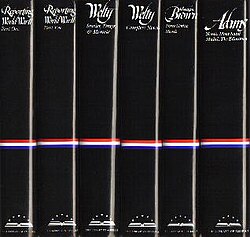 I am a little taken aback at the number of perfectly nice people willing to tell me what I don't read. I will admit that as I've gotten older and fatter, so have the books I prefer to read. I do, however, read new books, of necessity, both for my job and for the committee on which I serve, and I am no more averse to having recommendations made me than I am to making. But my prejudices I freely, perhaps too freely, admit, and these, in common with my known preferences, tend to make people shy of putting their favorites in my way. Yet, when I ask a friend or a stranger for the name of the book before them, my curiosity is sincere, despite my evident reputation as a bully. On the rarer occasions when a recommendation is offered me, even by a friend, it is usually prefaced with an apology -- something I do myself, more often than not, and with better cause, as no one need like what I do -- it's just good manners. More frustratingly, lately, the books proffered me come with a warning, usually something like, "I love this book! But I know you won't care for it." Now that is no recommendation at all, is it?
I am a little taken aback at the number of perfectly nice people willing to tell me what I don't read. I will admit that as I've gotten older and fatter, so have the books I prefer to read. I do, however, read new books, of necessity, both for my job and for the committee on which I serve, and I am no more averse to having recommendations made me than I am to making. But my prejudices I freely, perhaps too freely, admit, and these, in common with my known preferences, tend to make people shy of putting their favorites in my way. Yet, when I ask a friend or a stranger for the name of the book before them, my curiosity is sincere, despite my evident reputation as a bully. On the rarer occasions when a recommendation is offered me, even by a friend, it is usually prefaced with an apology -- something I do myself, more often than not, and with better cause, as no one need like what I do -- it's just good manners. More frustratingly, lately, the books proffered me come with a warning, usually something like, "I love this book! But I know you won't care for it." Now that is no recommendation at all, is it?People can be shy of telling others what to read. This is true, even or specially among booksellers, who, every working day, tell strangers what they ought to read or might like. Again, I have no illusions, when happily burbling, for instance, some anecdote recently gleaned from my wonderful new, two volume set of Johnsonian Miscellanies, that the polite smiles with which this sort of thing are usually met are anything other than what they seem. I am indulged, affectionately, by my weary audience, from loyalty and, I suspect, because it is easier, as it were, to simply accept the slobbery tennis ball dropped at one's feet and pat the beast. When given the slightest encouragement, though, like any friendly mongrel, I will want to play on, so indulging me in yet another Johnson story can lead to rather lengthy trials of patience. I know this. My friends and coworkers know this, as does my long suffering, and not bookish husband, and yet I am let off leash often enough that I believe I must be loved. There is no better explanation. But I understand that while my enthusiasms are kindly accommodated, they are rarely shared, so I tend to tell stories from my books rather than press the books themselves into the hands of those that love me best. I think this may be the best compromise I may expect. I don't know just how infrequently these often muddled excepts have actually led anyone to the good books from which I made them. I don't know that I want to know. Actually, I am sadly aware of the limits of my influence, and my admitted eccentricities of taste, and prefer, like most chatty old parties, to imagine myself, if no evangelist, at least no preacher either. I hope to amuse and hope I don't, too often, bore.
When a friend at the bookstore, with whom I was at the time less well acquainted, was compiling a list of recommendations of the best books he had never had the opportunity of reading, having been an English major, there were many of the usual classics, Moby Dick and the like, (a book, by the way I've never been able to finish,) and my contribution, from the top of my big pointed head, was a little known gem by Daisy Ashford, The Young Visiters, or, Mister Salteena's Plan. Written when the author was all of nine years old, and published, in 1919, with a preface by no less than J. M. Barrie, this wonderful book has my favorite opening line:
"Mr. Salteena was an elderly man of 42 and was fond of asking people to stay with him."
It would be hard to improve on that, but Miss Ashford's book, so far as I'm concerned, just gets better and better. “My life will be sour grapes and ashes without you,” for example, is a line I have quoted, too often, and is but one of too many wonderful lines from this book. “Bernard always had a few prayers in the hall and some whiskey afterwards as he was rather pious,” for example, or “I am partial to ladies if they are nice. I suppose it is my nature. I am not quite a gentleman but you would hardly notice it,” which, again, I once dropped into any conversation I could. So for me to recommend this little book as not only a favorite, but a model, I think, of the best kind of English prose, for which, after all, he had asked, seemed quite the right thing to do. I offered dear little Daisy to my young friend, himself a writer, as the perfect antidote to the kind of BFA/MLA seriousness to which his list seemed otherwise inclining. Made perfect sense to me. Don't know that it made any sense to my friend, when he read it, though I know he did in fact do so, bless 'im, or that I explained my enthusiasm well enough to justify setting Miss Ashford down in The Pantheon next to Mr. Melville, but such is the danger of asking others for their best books.
I have read with great pleasure so many books otherwise unknown to me, based on no better authority than just such whimsical council. I believe, for the most part, I am at least polite, and I will try almost anything, once -- save perhaps heroin or morally instructional children's books. (A very different thing from a book by an author who happened to be a child, let me point out.) So I am a little hurt when told I will not care for something I haven't read. This may be true or it may not. Try me. You don't know until you do.
























